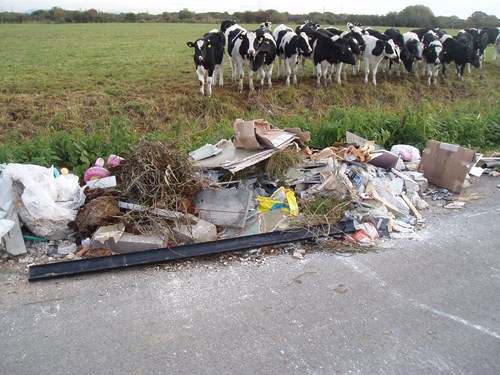Celebrating the successes of the Living Levels programme

Funded by the National Lottery Heritage Fund, the Living Levels programme is a partnership project that ran between 2018 – March 2022 with the aim of reconnecting people and communities to the Gwent Levels.
Led by RSPB Cymru, with Natural Resources Wales (NRW) as one of the partners, the project has achieved some incredible results over the last three years.
From conserving and managing important habitats for wildlife including the shrill carder bee and restoring orchards and field ditches; to improving visitor experience by creating new walking and cycling routes; to delivering more than 100 events and activities that have resulted in a revival of interest across the Levels and a reconnection of people with their environment, history, and communities.
In our newest blog, Catrin Grimstead and Kate Rodgers from our environment teams in South East Wales, and Pamela Jordan from Fly Tipping Action Wales look back on some of the key achievements of the Living Levels project.
Aiding the recovery of aquatic plants and animal communities
One of the projects under the Living Levels programme, was the natural heritage restoration project, which aimed to restore lost field ditches and manage riparian vegetation to help reduce the dominance of double-hedged ditches.
Kate Rodgers, one of our Environment Team Leaders, joined RSPB to help oversee delivery of this work, bringing experience of Gwent Levels SSSI (Site of Special Scientific Interest) management to the project, whilst improving knowledge and connections for future work.
Careful management by staff and contractors has helped to improve the flow and quality of water on the Levels and opened the ditches up to sunlight. This has helped to increase biodiversity and aided the recovery of aquatic plants that live on the Levels, such as Potomegeton species (fine-leaved pond weeds) and Ceratophyllum dermersum (Rigid hornwort), which are considered rare for the Gwent Levels.
The management of these ditches, is also important in helping to support the features of the Gwent Levels SSSIs. Field ditches are managed by private landowners and managed on a long cycle of 10 to 30 years. This cycle creates a mosaic of habitats, ranging from open water to more mature habitats for communities of aquatic and wetland plants and insects.
On the Gwent Levels, this cycle can be customised to suit the local area and a more beneficial cycle may now be 7-10 years. Lack of management has contributed to lower diversity and abundance of species. Where management has taken place, it shows that it can have a positive impact on diversity.
Over 30 fly-tipping cases investigated, and 10 prosecutions made
Early on in the programme, engagement with local residents revealed that one of the most serious concerns, and a problem really affecting both the environment and visitor experience to the Gwent Levels was the issue of fly-tipping.
To tackle this, it was agreed that one of the 24 projects that makes up the Living Levels programme should be a fly-tipping project, to be led by NRW's Fly-tipping Action Wales team, known as the Black Spots to Bright Spots project.
Over the last three years the enforcement element of the project, led by Pamela Jordan has achieved a number of successful outcomes - 10 successful prosecutions and 7 fixed penalty notices paid resulting in fines totalling £13,770.

Half of these prosecutions were made possible by the covert cameras that were installed at strategic points along the Levels, allowing the team to pro-actively gather evidence. To date, three individuals have been prosecuted for fly-tipping and two individuals have paid £400 in Fixed Penalty Notices as a direct result of images captured by the cameras.
Whilst the majority of convictions were for fly-tipping, we have also convicted individuals for waste duty of care breaches and fraud, and two waste carriers have had their licences revoked.
What’s next?
In 2021, the programme commissioned a legacy plan to explore a long-term and sustainable future for the project after the initial Lottery funding came to an end in March 2022. Its aim was to find a mechanism that would build on the success of the programme and deliver long-lasting benefits for the Gwent Levels landscape, heritage, and communities.
Support for a legacy project was demonstrated by RSPB, NRW, Newport City Council and Monmouthshire County Council, who each contributed funds to enable an 18-month transition phase, and the National Lottery Heritage Fund, who extended the deadline for the project to allow access to project underspend.
The project has also received support from Welsh Government and has recently been highlighted by the Minister for Climate Change Julie James, as an example of how partnership working on a landscape scale can help deliver the Sustainable Management of our Natural Resources (SMNR). A Gwent Levels Working group of partners and stakeholders has recently been convened and at the Ministers request it is proposed to use the Gwent Levels to develop and pilot new spatial planning guidance.
Throughout 2022 and 2023, the Living Levels team, alongside partners and other stakeholders, will be developing a plan to ensure a long-term sustainable future for both the Living Levels and the extraordinary landscape of the Gwent Levels.
You can keep up to date with the Living Levels project on social media : @ourlivinglevels
